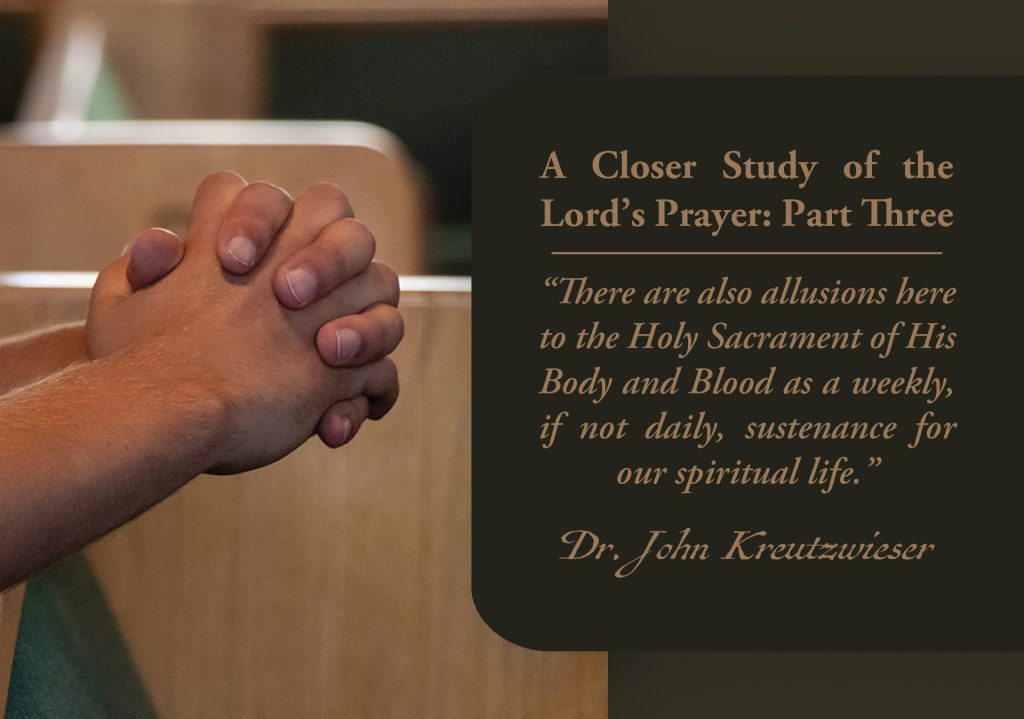A Closer Study of the Lord’s Prayer: Part Three
 NOTE: This is the third in a series of study articles on the Lord’s Prayer. See the introduction to the series, as well as Part 1 and Part 2.
NOTE: This is the third in a series of study articles on the Lord’s Prayer. See the introduction to the series, as well as Part 1 and Part 2.
by John Kreutzwieser
Give us this day our daily bread / And forgive us our trespasses as we forgive those who trespass against us
The Book of Proverbs reminds us to request from our heavenly Father: “Give me neither poverty nor riches; feed me with the food that is needful for me” (Proverbs 30:8). In other words: “Lord, give us what is appropriate for each day” (see Psalm 107:9). In the Lord’s Prayer, Jesus instructs us to pray every day for the things we need in life to live out forgiveness and love as we exist as God’s people.
One Old Testament story that illustrates this is the journey of the Israelites in the wilderness (Exodus 16:1-36). God led the people out of Egypt under the leadership of Moses to Mount Sinai and then towards the land promised to Abraham in the territory of the Canaanites. They journeyed through wilderness areas on the trek and bemoaned the lack of sufficient food available for the journey. In response to their cries, God provided manna each morning from the first day of the week for six days. On the seventh day, there was no manna to gather but a double portion was provided on the sixth day. On the Sabbath Day—the seventh day—God’s Word was to be their bread. The manna was sufficient for their daily needs (see Deuteronomy 8:1-20). This continued for 40 years.
As we pray this unit of the Lord’s Prayer every day, we are reminded that it is God that ultimately provides all we need for life (see Psalm 145:15-16) and that we are to receive this bread with thanksgiving (see 1 Timothy 4:4-5). As Martin Luther reminds us in the Small Catechism (see the 4th Petition of the Lord’s Prayer), when we pray for “daily bread” we’re also asking for “everything that belongs to the support and wants of the body, such as meat, drink, clothing, shoes, house, homestead, field, cattle, money, goods, a pious spouse, pious children, pious servants, pious and faithful magistrates, good government, good weather, peace, health, discipline, honour, good friends, faithful neighbours, and the like.”
There are also allusions here to the Holy Sacrament of His Body and Blood as a weekly, if not daily, sustenance for our spiritual life.
Also included in this daily bread we pray for is Jesus Himself (see John 6:22-59). Jesus Christ is the bread of life that is given for us and for all in the world. There are also allusions here to the Holy Sacrament of His Body and Blood as a weekly, if not daily, sustenance for our spiritual life.
Daily bread is provided by God so that we may be of service to others (see Matthew 25:35-37). The provisions for life are not just for us. We are fed to forgive, love, and care for our families, neighbours, and all in the world. God has forgiven, loved, and cared for us in Christ so that we would be empowered to share our daily bread with the world. What greater epitaph could be chiselled on our tombstone than, “They lived a life of forgiveness to all just has Christ has forgiven them”?
What is commonly translated as “trespasses” in the Lord’s Prayer actuals implies obligations (see Luke 17:10). We petition our heavenly Father to pardon us in failing to keep our obligations to Him just as we also let go of indignation when others fail in their responsibilities to us (see Matthew 18:23-35).
We pray for help in fulfilling our obligations to others. “Owe no one anything, except to love each other, for the one who loves another has fulfilled the law” (Romans 13:8). Paul begged Philemon to forgive Onesimus of his obligations out of love for Christ (see Philemon 8-18). Since God readily forgives, loves, and cares for us we seek divine aid to do the same to others (see 1 John 4:7-11).
To accomplish the obligation of forgiveness, we need to be sustained by the stuff of life that God provides for us. And so, we pray daily for bread that we might be people who live out the forgiveness we have from Christ.
———————
Rev. Dr. John Kreutzwieser is pastor emeritus of Emmanuel Lutheran Church in Moose Jaw, Saskatchewan.



